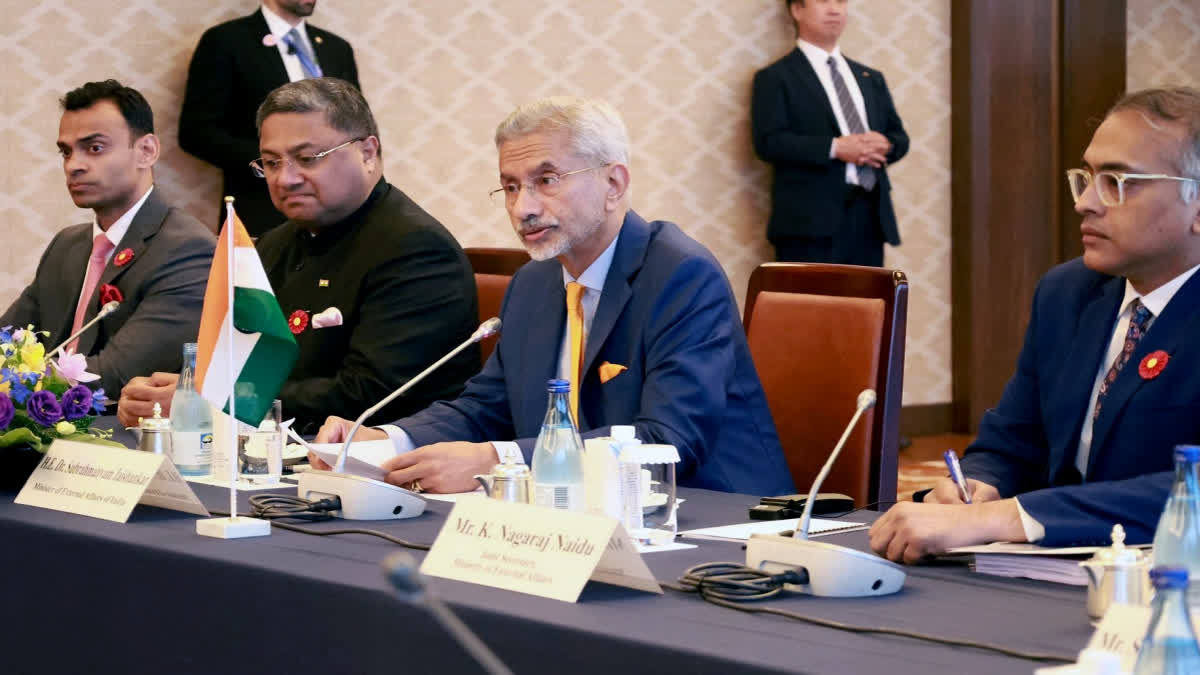New Delhi: External Affairs Minister Dr S Jaishankar on Monday expressed concern over the Russia-Ukraine conflict stating that the use of force doesn't resolve problems between countries.
Addressing the press at the Japan National Press Club in Tokyo, Jaishankar said, "In the last two and half years, the conflict has deepened. It has cost lives, and economic damage and has caused global consequences. It has impacted other societies, created food shortages, raised energy costs, and contributed to global inflation. In some cases, it has even directly triggered the economic crisis."
"We do not think that solution will emerge from the battlefield. War may go on, lives may be lost..but we won't see a decisive outcome. We believe that there should be a return for dialogue and diplomacy. Our feeling today is that more needs to be done. We shouldn't resign ourselves to the continuation of the current state of conflict. There are not many countries talking to both Russia & Ukraine. We should be more active there," added Jaishankar.
He pointed out that Prime Minister Narendra Modi met Ukrainian President Volodymyr Zelenskyy at the G7 summit in Italy. "We were in Moscow and we had a chance to discuss with (Russian President) Prez (Vladimir) Putin at great length. Things move from the battlefield to the conference table, that is our endeavour," he added.
When asked about the possible visit of Prime Minister Modi to Ukraine, Jaishankar said, "I can reasonably expect that there will be more contacts between us and Ukraine, between us and Russia. Like any government, we make our position known at the right time, at the right channel."
Jaishankar is currently on a visit to Tokyo at the invitation of the Foreign Minister of Japan, Yoko Kamikawa to participate in the meeting of the Quad Foreign Ministers.
The QUAD, consisting of the United States, India, Japan, and Australia, is an informal strategic forum aimed at promoting a free, open, and inclusive Indo-Pacific region. The group's discussions typically focus on key issues such as security, economic cooperation, and regional stability.
Following the quad foreign ministers meeting in Tokyo today, the quad leaders jointly expressed their deepest concern over the war raging in Ukraine including its terrible and tragic humanitarian consequences. They called for the need for a comprehensive, just, and lasting peace in line with international law, consistent with the purposes and principles of the UN Charter, including respect for sovereignty and territorial integrity.
The quad foreign ministers also noted the negative impacts of the war in Ukraine on global food and energy security, especially for developing and least-developed countries.
"In the context of this war, we share the view that the use, or threat of use, of nuclear weapons is unacceptable. We underscore the importance of upholding international law, and in line with the UN Charter, reiterate that all states must refrain from the threat of or use of force against the territorial integrity and sovereignty or political independence of any state," the quad foreign ministers said in the joint statement.
India's role in the Russia-Ukraine conflict has been characterised by its position as a neutral intermediary, reflecting its broader foreign policy principles of non-alignment and strategic autonomy. India has maintained a neutral stance in the Russia-Ukraine conflict, emphasising its desire for dialogue and peaceful resolution.
It has refrained from explicitly condemning Russia's actions, a position that contrasts with many Western countries and organisations that have criticised Russia’s invasion of Ukraine. The country has consistently advocated for dialogue and diplomacy as the means to resolve the conflict. Indian officials have called for both Russia and Ukraine to engage in direct talks and seek a peaceful resolution to their differences.
During the early stages of the conflict, India undertook a significant evacuation operation to bring Indian nationals, particularly students, back home from Ukraine. This operation, known as "Operation Ganga," was a major diplomatic and logistical effort. New Delhi has sought to engage with both Russia and Ukraine to encourage dialogue and understanding. Indian leaders have spoken with counterparts from both countries, urging a resolution through negotiations and maintaining open lines of communication.
India’s neutral stance has attracted criticism from some Western countries and analysts who argue that it could be perceived as tacit support for Russia’s actions. This criticism highlights the challenges India faces in balancing its historical ties with Russia and its growing strategic partnerships with Western nations.



